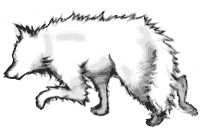
 |
 |
| Home |
| About Orkney |
| History |
| Tradition |
| Folklore |
| Placenames |
| Images |
| Downloads |
| About the Site |
| Contact |
| Links |
| Search Site |
| Awards |
| Orkney's Harvest Lore | |
|
The Significance of the Wolf
The origin of the bikko tradition is now long lost but from the Old Norse name given to the effigy it would be reasonable to assume that the custom is either Norse in origin or was an early Orcadian custom adopted and adapted by the Norse settlers. As you will see later, the evidence indicates the former. So bearing this in mind we should be able to look outside Orkney in order to gain some idea to the bikko's original form and meaning. The first thing we must realise is that the country the early settlers left to make their way westwards was very different to Orkney - their final destination. The scenery was different, the climate different and the wildlife very different. As can be seen clearly in the folklore section of this site, over the years the settlers and their offspring adapted their own myths and traditions to suit their new home. The bikko may have been one such adaptation. As you will see later, the personification of the crop spirit as a wolf is a reasonably widespread custom across northern Europe - a place where wolves once roamed freely. Orkney had no wolves so after a few generations, the idea of a wolf would have been alien to the offspring of the Norse settlers. Was the wolf gradually forgotten, replaced in the imagination of the new Orcadians by the more familiar figure of a dog? So in order to learn more of Orkney's straw dog, we shall first look to the widespread belief across Europe that in one form or another the spirit of the growing crops took the form of a wolf. In the fields of France and northern Germany, for example, the spirit of the crops was definitely regarded as a wolf and referred to when the wind rippled in waves across the ripening fields. When this happened it was said, "the wolf is going through". Along the same lines, if a living wolf were seen in the crop fields, the peasants would watch to see whether his tail hung low or was carried high. The animal's tail hanging down was a sure sign that the creature was a manifestation of the crop spirit and was therefore saluted by the watching workers. At harvest time, this wolf spirit was thought to move through the fields of grain directly ahead of the line of reapers, narrowly avoiding their killing strokes. In the event of an accident where a reaper fell or perhaps cut himself with his scythe it was declared that the "wolf got him". An even closer parallel to the Orcadian bikko can be found in the French custom of calling the last sheaf the "wolf sheaf". The French reaper who cut this last sheaf (thus symbolically killing the wolf spirit) was referred to as "the wolf" until the following spring. In Orkney, as we have seen elsewhere, the last man to harvest was presented with the straw "wolf" - could this have some way marked him as being the Orcadian equivalent of "the wolf". Different areas had different customs regarding the "wolf sheaf" with some areas burning it while others took it home and kept it until it was destroyed in spring. Other lupine connections to the last sheaf are found elsewhere across the Old World and may hark back to an even earlier tradition where the wolf/dog originally represented the Teutonic god Odin (Woden). In Gross Trebow in Germany, the last sheaf (also referred to as "the wolf") was left to stand "for the Wolf, as fodder for his horse." The idea of a wolf having a horse immediately looks nonsensical until we consider the fact that in this case, the "Wolf" may be a corruption of "Wodan" (Norse: Odin). This idea is more or less confirmed when we consider the traditions particularly prevalent in Denmark and Sweden in which the last sheaf of the harvest was definitely reserved for Odin's horse. An old Germanic Last-Sheaf charm recorded in 1593 says:
Other variants of the last sheaf's name also point to an Odin connection - Wode, der Wod, Wod's Fodder, and Wold being just a few. |
|
